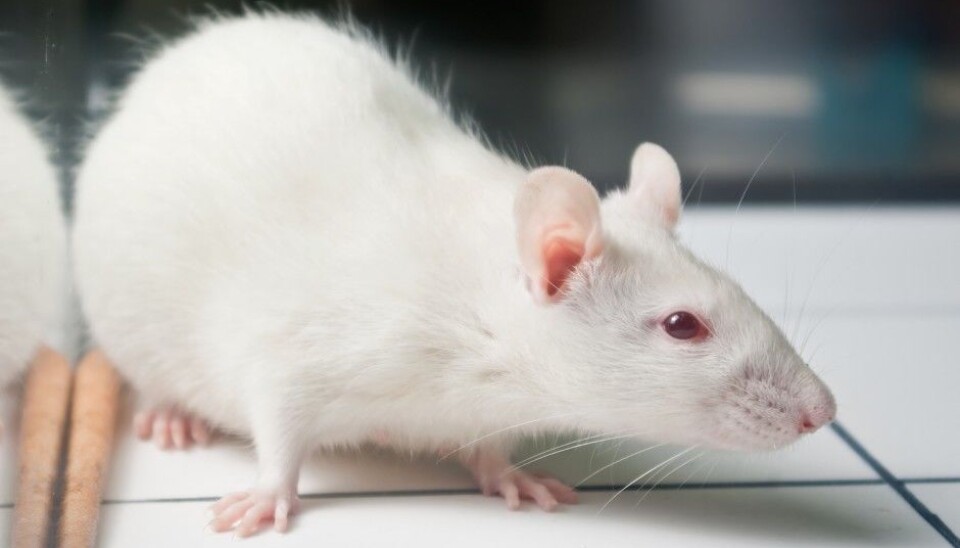
Brain clings to nicotine craving
Nicotine dependence lasts much longer than we have figured. The reward system in the brain remains altered several months after breaking the habit, according to Swedish research on rats. This problem is worse for the youngest nicotine addicted rats.
Three out of five smokers who have suffered heart attacks continue to puff on cigarettes according to a Norwegian study recently presented by the newspaper Aftenposten. Only a minority manage to quit smoking even after having potentially fatal infarcts.
Why is it so hard to break the tobacco habit? Swedish studies appear to provide some answers.
Swedish researchers have studied the brains of lab rats that have been made dependent on nicotine. They find that nicotine creates chronic changes in the brain’s reward centre. The younger the rats were when they were turned into nicotine slaves the greater the changes in their brains.
Took more risks
Things went as expected in the initial period after the researchers stopped supplying the rats with nicotine. But something odd occurred three months later.
The rats that had not been given nicotine for three months suddenly became more impulsive.
“The nicotine animals spent more time in the frightening, brightly lit areas which prey naturally fear and try to avoid than the [control] animals that had only been injected with saline solution,” says the researcher Julia Morud Lekholm.
Change in reward system
Swedish scientists could also see changes in the brain’s reward system among the individual rats that previously had been injected with nicotine, according to the study which was performed at the Sahlgrenska Academy in Gothenburg.
“This indicates that nicotine creates long-lasting changes which we have not known about,” says Julia Morud Lekholm to ScienceNordic’s Swedish partner, forskning.se.
The drug leads to a cascade of effects that worsen as time passes. Morud Lekholm took her doctorate in dependency medicine at the University of Gothenburg Department of Neuroscience and Physiology.
Worse as time passes
The researchers tested 109 rats. Half received doses of nicotine for three weeks while the other half got a saline solution.
The changes in the nicotine-addicted brains were in areas that normally slow down brain signals.
After another four months the GABA system, as it is called, in the nicotine rats was impacted so much that its function reversed completely. Instead of suppressing impulses between neurons it increased them.
This can cause poorer impulse control.
The researchers think if the same mechanisms are in play for us as in rats this enhances the risk of relapses and falling back into the smoking or snusing habit.
Possible impact on use of other drugs
The researchers reason that to some extent this tendency toward risk activity can be applied to humans.
“Poor impulse control yields a higher risk of encountering dangerous situations. It can also have an effect on other types of substance use later in life,” says Lekholm.
She thinks the changes in the brain go some way in explaining why it is so hard for many to quit smoking or using snus. It indicates that the craving for nicotine is tough to withstand, even a long time after quitting.
“This is a lifetime struggle. We understand this when we see that the animals have substantial changes in their brains’ reward systems, even after a lengthy abstention from nicotine,” says Julia Morud Lekholm to forskning.se.
Share of smokers radically down
Despite that, new figures in Norway that an increasing number of persons manage to quit smoking or refrain from starting. The share of the population that smokes on a daily basis has dropped from 24 percent to 13 percent in the past ten years.
“There is consolation in the fact that the intake methods for nicotine are increasingly the less dangerous alternatives such as snus and e-cigarettes,” said research manager Karl Erik Lund of the Department of Substance Use at the Norwegian Institute of Public Health earlier this year.
Similar neural systems
Of course there are significant differences between lab rats and humans. But we have much in common as regards the neural connections in the brain’s reward system, according to Lekholm.
That said, the time it takes for changes in the brain to occur can differ greatly between us and rodents.
The scientists repeated their experiment twice more, giving rats nicotine for three-week periods. They wanted to ensure that the unexpected result was not a fluke.
The results were the same each time.
This study was part of Lekholm’s doctoral dissertation, which she presented at the University of Gothenburg last week.
-------------------------------------
Read the Norwegian version of this article at forskning.no
Translated by: Glenn Ostling
Scientific links
- J.M Lekholm: Nicotine sensitization and the effects of extended withdrawal – behavioral, neurochemical and electrophysiological studies in the rat
- J. Morud et al.: Nicotine produces chronic behavioral sensitization with changes in accumbal neurotransmission and increased sensitivity to re-exposure. Abstract. Addiction Biology 8 January 2015.
- L. Adermark L, Morud J et al.: Age-contingent influence over accumbal neurotransmission and the locomotor stimulatory response to acute and repeated administration of nicotine in Wistar rats. Abstract. Neuropharmacology 14 June 2015






